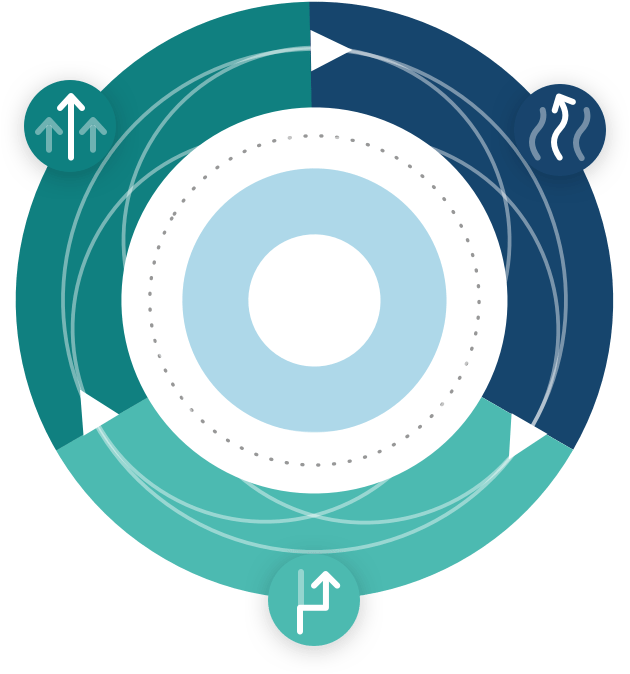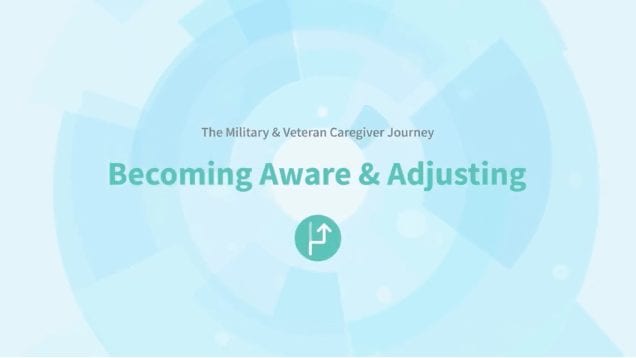becoming aware & adjusting
Key Caregiver Experiences
Feeling pressure to take on extra responsibilities at home
Experiencing difficulty focusing in day-to-day life
Experiencing overwhelming uncertainty and stress
Feeling trapped between seeking help and maintaining normalcy
Losing opportunities for contact with friends, family, and their community
Experiencing conflicting feelings of guilt and shame
About This Stage
Military and veteran caregivers may realize changes in their loved one suddenly, if their service member or veteran experiences combat-related injuries. Alternatively, they may notice these changes slowly over time, as the symptoms of invisible wounds or illness slowly reveal themselves. The changes might also manifest as new developments in an already recognized health care issue.
As caregivers adjust to changes in their loved one, they often take on additional responsibilities around the home and may try to maintain “normalcy” as they attempt to handle the changes. Caregivers will often feel increasingly stressed or uncertain, and will eventually start to seek out more targeted support for their needs and the needs of their loved one.
becoming aware & adjusting
Key Caregiver Needs
Opportunities for self-care / respite from caregiving responsibilities
Access to community services & resources
Counseling for the caregiver’s children and family
Counseling for the caregiver’s marriage or relationship
Understanding of the stages in the caregiver journey
Access to emergency funding and grants
Flexibility in the caregiver’s work schedule
Need more support? Visit our Caregiver Resource Directory.
Learn more about the Caregiver Journey Map
Landmark
Notices Changes
Caregiver begins to notice significant changes in loved one.
Caregiver begins to notice significant changes in loved one.
Video
Faun is a caregiver to her husband, Danny. Danny, a wounded combat veteran, provides care and support to other veterans. Faun discusses what the beginning of the caregiver journey was like for her.
Journey Step
React
Tries to maintain balance at home, takes on increasing household responsibilities.
Tries to maintain balance at home, takes on increasing household responsibilities.
Early Feelings As You Deal with Trauma
- Feeling the need and constant guilt that “I need to be present at all times to care for my” soldier/Veteran/family member.” Feeling overwhelmed by managing the complex medical situation of the ill person and needing to be present 24/7, so as to “be the voice,” speak-up for the person who is unable, and left to experience enormous guilt if you do leave and something goes wrong.
- Caregivers often know they NEED to take care of themselves, but do not feel like there is any time available to do so. Eventually, the weeks roll into months and even years that caregivers will put off their own health care or general everyday healthy ways to care for themselves (healthy eating, sleep quality, exercise, etc.). Or, when you do take the time, caregivers feel an overwhelming sense of guilt if something gets forgotten during their absence or something negative happens when they are away. When this happens caregivers are less likely to take time in the future.
- Being a caregiver to another person is hard. It is easy to forget about ourselves or other responsibilities. Often caregivers do not allow themselves to think of the negative emotions, or to admit the “being a caregiver is hard.” Caregivers often feel the need to be positive and are not allowed to entertain the difficult emotions that are normal for caregivers to experience, i.e.: fear, anxiety, worry, overwhelmed, anger, loneliness, and dislike for the situation to name a few. It may help to find a caregiver support group to normalize one’s experience and understand that both positive and negative emotions exist when providing care for another person. It is healthy to talk about all emotions, even with the ill person (when appropriate), as they are likely experiencing similar emotions.
- Pride – can often get in the way of asking for help when you really need it. Sometimes very minimal things are needed: respite for the day to go to a much needed medical appointment to something much larger, i.e. financial concerns becoming unmanageable. Often, the challenges associated with being a caregiver are easier to deal with when addressed sooner vs. later. Waiting to address problems until they are so large and overwhelming is much more difficult to resolve and/or find resources for. As difficult as it may seem your situation is not unique and there are often agencies available to help before things get out of control.
Most of all caregivers need to know there is help.
Caregivers are not alone and there are many support services available to help navigate this journey. Caregiving is a complicated experience, leaving loved ones with a highly demanding job as caregiver, dealing with emotions associated with the changes in their loved ones person and juggling the normal, everyday demands of life.
Information contributed by:
The Fisher House program provides “a home away from home” for families of patients receiving medical care at major military and VA medical centers. Learn more: www.fisherhouse.org.
Journey Step
Adjust
Veteran’s relationship with family and friends begins to change, and the caregiver begins researching symptoms.
Veteran’s relationship with family and friends begins to change, and the caregiver begins researching symptoms.
Video
Faun is a caregiver to her husband, Danny. Danny, a wounded combat veteran, provides care and support to other veterans. Faun discusses how she adjusted to her role as caregiver.
A recent RAND study found that since 9/11, 2.77 million service members have served on 5.4 million deployments. It is now common to see veterans who served in multiple combat tours; in the case of continuous deployments there may be little rest in between those potentially traumatic experiences (PTE). Increased deployments also impact military family life. Family members are called upon to meet the unanticipated or unplanned needs of their veterans.
About Potentially traumatic experiences (PTE)
As time spent deployed increases, subsequent exposure time to PTE increase. Post-Traumatic Stress Disorder (PTSD) prevalence among Operations Enduring Freedom (OEF) and Iraqi Freedom (OIF) veterans is estimated at 23%. This rate is higher than experienced in past conflicts. For example, PTSD rates of returning veterans from the Vietnam War ranged between 2-17%. A wide variety of symptoms may be signs that you are experiencing posttraumatic stress disorder such as feeling upset by things that remind you of what happened, having nightmares, or flashbacks, feeling emotionally cut off from others, feeling constantly on guard, and irritability (Fulton et al., 2015). This increased level of trauma may have a collective effect on the family.
Another source of potential psychological distress may occur when transitioning from being a service member to a civilian (i.e., transitional stress). This is not as simple as transitioning careers; it involves transitioning cultures, worldviews, and master identity roles. Warriors transition in a relatively quick manner from a collective culture (i.e., military) to an individualistic culture (i.e., mainstream culture in the United States), allowing for minimal, if any, form of guided adjustment.
Video
Danny discusses how his relationship with family and friends began to change.
Adjusting to civilian life
In the military, individuals become part of an identity or value system that is greater than the individuals who make up the whole. This notion is lofty and encompassing enough that individuals consider it is worth sacrificing a life for. The worldview that is created from the notion that you are willing to die for your fellow service member at a moment’s notice and they are willing to do the same provides a salient and deeply anchored self-identity that is unique to the military culture.
Moving from a culture that provides you meaning for nearly all that you do (i.e., in the form of rules and regulations) to one that lacks that type of instructional identity formation can be a stressful journey and is a journey that the caregiver or family member will also experience. Moreover, moving from a worldview of being part of a greater good to one that endorses self-interest, self-reliance, self-governance (i.e., individualistic culture) can augment psychological distress that may be present due to invisible or visible wounds of war.
This anomic sense of self and identity may further isolate the warrior and make him/her feel alone and worthless as they struggle to find meaning in their life. This may then lead to isolation and entrenchment in that isolation from family and friends, who are left feeling frustrated and powerless.
Information contributed by:

Since 2003, Wounded Warrior Project® (WWP) has been transforming the way America’s injured veterans, caregivers, and family members are empowered, employed, and engaged in our communities through over a dozen free services in mental health, career counseling, and long-term rehabilitative care. For more information visit: www.woundedwarriorproject.org.
Video
Meg Kabat, National Director of the VA Caregiver Support Program, discusses how to manage the stress of being a caregiver.
Landmark
Identifies as Caregiver
Self-identifying as a ‘caregiver’ can happen at any stage. Many reject the term at first, finding it hard to…
Self-identifying as a ‘caregiver’ can happen at any stage. Many reject the term at first, finding it hard to identify with the label.
Video
Jennifer Mackinday, caregiver to her brother, discusses how she realized she was a caregiver.
You may be a military or veteran caregiver if you do any of the following for a current or former member of the US Armed Forces…
- …manage medication
- …schedule or coordinate medical appointments
- …assist in the care of a disabling wound, injury, or illness
- …provide emotional and/or physical support
- …monitor environmental issues or triggers
- …assist with activities of daily living (ADLs) and/or instrumental activities of daily living (IADLs)
- …provide cognitive help
- …advocate for proper treatment and care for your loved one
Information contributed by:

The Elizabeth Dole Foundation’s mission is to strengthen and empower America’s military caregivers and their families by raising public awareness, driving research, championing policy, and leading collaborations that make a significant impact on their lives. A campaign of the Foundation, Hidden Heroes brings vital attention to the untold stories of military caregivers and seeks solutions for the tremendous challenges and long-term needs they face.
Video
Terri Tanielian, a Senior Behavioral Scientist at the RAND Corporation, discusses why it’s important to identify as a caregiver.
Landmark
Tipping Point
Caregiver is angry and frustrated—“what’s happening to my family?!”
Caregiver is angry and frustrated—“what’s happening to my family?!”
It takes great courage, self-awareness and humility to accept that you need support. Reaching out for mental health care is a sign of bravery and strength. You are not alone in your struggle, approximately 1 in 5 adults in the US will experience a mental illness in a given year. Most important is that you want to feel better and you’re seeking help. You are already on your way to mental wellness.
Considerations when seeking help
You may be feeling a multitude of emotions. It is normal to swim in a sea of emotions – your vision of your future just changed. Learning the Five Signs of Emotional Suffering and the Habits of Healthy Wellbeing may help you identify these reactions and guide your responses to the changes in your life.
If you choose to seek the support of a mental health professional, be sure to find someone with whom you feel comfortable and safe. Your counselor/social worker/psychologist/psychiatrist wants you to share with them to your comfort level; Only by letting them in can they begin to help you on your journey. You may connect with a mental health professional who has not experienced life as a caregiver…this is ok…share with them what the experience is like for you personally. They want to tailor your treatment specifically for you and hold the flashlight for you as you walk your own unique path.
It may be difficult to connect with family and friends during this time. Seeking support of peers and skilled professionals can be very helpful. Remember that you, too, are in a period of adjustment and change. Be gentle with yourself as you move into this new role.
Remember:
- You have the right to seek mental health support.
- You have the right to see someone who specializes in your area of need.
- You have the right to trust and rapport between you and the
provider. - You have the right to try out multiple providers until you find the
right fit. - You have the right to share to your comfort level and take your time
opening up.
Hopefully you will find that friends and family members are supportive of your decision to seek counseling. Some may be curious and ask you questions – others may assume you will share if you decide to. Some people may not understand – or may actually disagree with your choice. As long as you are comfortable, you don’t need anyone’s permission – and you don’t have to try to change anyone’s mind. You deserve the care you are getting.
Information contributed by:

Give an Hour’s national network of volunteer mental health professionals are focused on providing free and confidential mental health care to those who serve, our veterans, and their loved ones.
Transition Point
Crisis
“Something needs to change!” - tipping point at home
“Something needs to change!” – tipping point at home
As caregivers continue along the Becoming Aware and Adjusting stage, they will often reach a tipping point that prompts them to seek an increased level of support, transitioning them into the Shifting Priorities and Seeking Help stage. Often, this transition is prompted by a crisis that a caregiver experiences with their loved one such as an accident or an escalation of health concerns. Caregivers might also reach a moment of personal crisis, and their frustration with their new reality will push them to seek further support.




